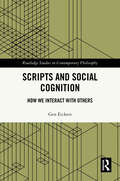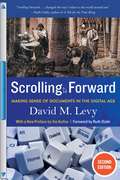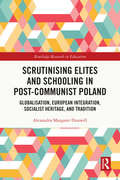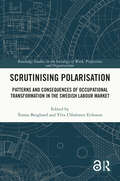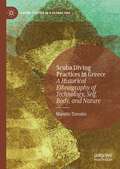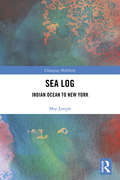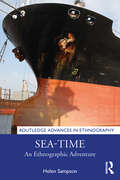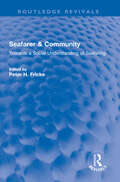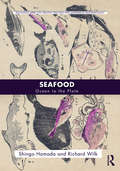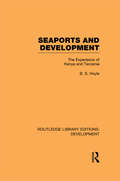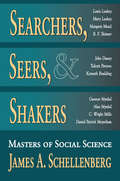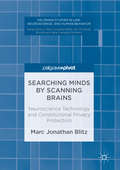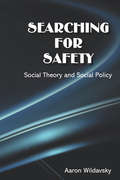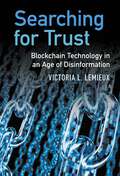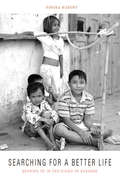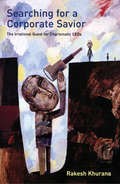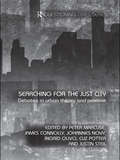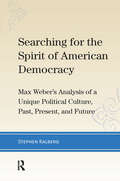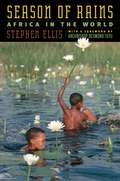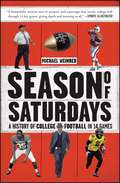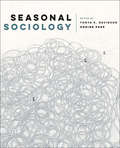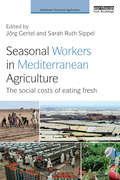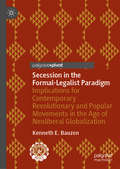- Table View
- List View
Scripts and Social Cognition: How We Interact with Others (Routledge Studies in Contemporary Philosophy)
by Gen EickersThis book argues that our success in navigating the social world depends heavily on scripts. Scripts play a central role in our ability to understand social interactions shaped by different contextual factors.In philosophy of social cognition, scholars have asked what mechanisms we employ when interacting with other people or when cognizing about other people. Recent approaches acknowledge that social cognition and interaction depend heavily on contextual, cultural, and social factors that contribute to the way individuals make sense of the social interactions they take part in. This book offers the first integrative account of scripts in social cognition and interaction. It argues that we need to make contextual factors and social identity central when trying to explain how social interaction works, and that this is possible via scripts. Additionally, scripts can help us understand bias and injustice in social interaction. The author’s approach combines several different areas of philosophy – philosophy of mind, social epistemology, feminist philosophy – as well as sociology and psychology to show why paying attention to injustice in interaction is much needed in social cognition research, and in philosophy of mind more generally.Scripts and Social Cognition: How We Interact with Others will appeal to scholars and graduate students working in philosophy of mind, philosophy of psychology, social epistemology, social ontology, sociology, and social psychology.
Scrolling Forward, Second Edition: Making Sense of Documents in the Digital Age
by David M. Levy Ruth OzekiA fascinating, insightful, and wonderfully written exploration of the document.Like Henry Petroski’s The Pencil, David Levy’s Scrolling Forward takes a common, everyday object, the document, and illuminates what it reveals about us, both in the past and in the digital age.We are surrounded daily by documents of all kinds-letters and credit card receipts, business memos and books, television images and web pages-yet we rarely stop to reflect on their significance. Now, in this period of digital transition, our written forms as well as our reading and writing habits are being disturbed and transformed by new technologies and practices.An expert on information and written forms, and a former researcher for the document pioneer Xerox, Levy masterfully navigates these concerns, offering reassurance while sharing his own excitement about many of the new kinds of emerging documents. He demonstrates how today’s technologies, particularly the personal computer and the World Wide Web, are having analogous effects to past inventions-such as paper, the printing press, writing implements, and typewriters-in shaping how we use documents and the forms those documents take. Scrolling Forward lets us see the continuity between the written forms of today and those of the past.Skyhorse Publishing, as well as our Arcade imprint, are proud to publish a broad range of books for readers interested in history--books about World War II, the Third Reich, Hitler and his henchmen, the JFK assassination, conspiracies, the American Civil War, the American Revolution, gladiators, Vikings, ancient Rome, medieval times, the old West, and much more. While not every title we publish becomes a New York Times bestseller or a national bestseller, we are committed to books on subjects that are sometimes overlooked and to authors whose work might not otherwise find a home.
Scrutinising Elites and Schooling in Post-Communist Poland: Globalisation, European Integration, Socialist Heritage, and Tradition (Routledge Research in Education)
by Alexandra Margaret DunwillThis book offers new insights and methodological tools to improve our understandings of how prestigious schools in Poland navigate the major political, social and cultural crosscurrents. The range of choice for elite schooling in Poland has expanded during its post-communist transformation. However, while elite education in countries such as the US, Australia, UK, France, and Switzerland has been extensively studied, post-communist countries have been largely neglected. This book explores the emergence of such schools within a context influenced by a range of different and often conflicting social forces. In doing so, the study elucidates how the socio-historical processes since 1989 diversified Poland’s egalitarian education system and facilitated the emergence of schools for elites. The book demonstrates that social and political changes in Poland triggered the emergence of new elites with different political and social outlooks, leading to a variety of types of elite schools that reflect and reproduce the elites’ positions and idiosyncrasies. A bespoke theoretical arrangement scrutinises extant and generated data from elite schools’ websites, online readers’ forums, and interviews with elite school principals. The book contributes new insights into elite schools in Central and Eastern European (CEE) countries, enriching the existing body of knowledge on elites and elite schools around the world. It will be of interest to researchers and postgraduate students investigating elite education, sociology of education, education policy, and education and international development.
Scrutinising Polarisation: Patterns and Consequences of Occupational Transformation in the Swedish Labour Market (Routledge Studies in the Sociology of Work, Professions and Organisations)
by Tomas Berglund Ylva Ulfsdotter ErikssonThis book scrutinises polarisation in Sweden, identifying patterns and variations in labour market transformation and exploring the consequences in terms of jobs, income, prestige, unionization and employment security, as well as the effects on different social groups. Through a series of empirical studies, it sheds light on changes in the occupational structure and the ways in which these changes interact with other societal trends, such as increased temporary employment, rising migration and decreased unionization, whilst also exploring changes in the evaluation of occupations and attitudes towards trade unions. Drawing on distinctly sociological perspectives, it shows how transformations in society and the labour market have affected conditions for individuals and considers whether these changes reinforce existing inequalities occasioned by polarisation or create new ones. Scrutinising Polarisation considers whether and how the Swedish labour market has polarized – and, if so, what this means for individual employees and labour organizations. It will therefore appeal to scholars with interests in the sociology of work and professions, social inequalities and labour market transformations.
Scuba Diving Practices in Greece: A Historical Ethnography of Technology, Self, Body, and Nature (Leisure Studies in a Global Era)
by Manolis TzanakisThis book provides a historical-sociological analysis of recreational scuba diving practices. Starting from a national case study, Greece, the book analyzes the gradually evolving global institutional arrangements of this version of underwater recreational activities. Based on the author’s experience as a former diving instructor and on an historical and sociological research of scuba diving in Greece, the book examines the stages of institutionalization of scuba diving as a leisure practice on a global scale, from 1945 to the present day. It combines two traditions: the phenomenological approach of underwater multisensory embodied experience and tourism studies. The two main research questions that the project answers are (a) how scuba diving has historically been shaped as a leisure activity, (b) how has underwater experience been conceptually shaped as a leisure activity. This case is an excellent example for exploring the relationship between society, technology, body and modern practices of self in the late modernity world, under a phenomenological and historical perspective.
Sea Log: Indian Ocean to New York (Changing Mobilities)
by May JosephThe ocean has always been the harbinger of strangers to new shores. Migrations by sea have transformed modern conceptions of mobility and belonging, disrupting notions of how to write about movement, memory and displaced histories. Sea Log is a memory theater of repressive hauntings based on urban artifacts across a maritime archive of Dutch and Portuguese colonial pillage. Colonial incursions from the sea, and the postcolonial aftershocks of these violent sea histories, lie largely forgotten for most formerly colonized coastal communities around the world. Offering a feminist log of sea journeys from the Malabar Coast of South India, through the Atlantic to the North Sea, May Joseph writes a navigational history of postcolonial coastal displacements. Excavating Dutch, Portuguese, Arab, Asian and African influences along the Malabar Coast, Joseph unearths the undertow of colonialism’s ruins. In Sea Log, the Bosphorus, the Tagus and the Amstel find coherence alongside the Arabian Sea and the Indian Ocean. Written in a clear and direct style, this volume will appeal to historians of transnational communities, as well as students and scholars of cultural studies, anthropology of space, area studies, maritime history and postcolonial studies.
Sea-Time: An Ethnographic Adventure (ISSN)
by Helen SampsonThis book is an ethnography that draws upon 25 years of qualitative research and shipboard fieldwork in the merchant cargo shipping sector. It explores the lives and work of seafarers and how these have changed over time. Change over time and the experience of time on board are organising themes throughout the text. They are contextualised with accounts of transformation in the regulation of the shipping industry and technological innovation.The book begins with a unique account of a voyage on a container ship. In this, the author details both the research process and the daily activities and shared thoughts of the seafarers who are on board. The narrative is further enhanced with illustrative examples taken from other voyages to illustrate continuities and change over time.The book will be of value to individuals, scholars, and researchers interested in ethnography of all kinds. Sociologists, anthropologists, maritime studies students, seafarers, ship operators and policy makers will find the text engaging and revealing. It provides a vivid account that will appeal to academics interested in the study of work, workplace change and time. It is accessibly written and will be enjoyed by readers interested in the contemporary shipping industry, and the life and work of seafarers.
Seafarer & Community: Towards a Social Understanding of Seafaring (Routledge Revivals)
by Peter H. FrickeSeafarer & Community (1973) examines life on shipboard and how the communities which rely on the sea for their livelihood exist. The main theme running through the chapters in this book is the observation of seafaring as an occupational community, as observed by anthropologists, economists, geographers, psychologists, seafarers and sociologists. The book explores the nature of seafaring communities, and asks whether they exist as communities in their own right or if they are occupational subgroups within a larger community. It also examines the psychological impact on seafarers of working within the closed communities of ships, and analyses the problems of training and recruitment.
Seafood: Ocean to the Plate (Routledge Series for Creative Teaching and Learning in Anthropology)
by Richard Wilk Shingo HamadaSeafood?draws on controversial themes in the interdisciplinary field of food studies, with case studies from different eras and geographic regions. Using familiar commodities, this accessible book will help students understand cutting-edge issues in sustainability and ask readers to think about the future of an industry that has lain waste to its own resources.?Examining the practical aspects of fisheries and seafood leads the reader through discussions of the core elements of anthropological method and theory, and the book concludes with discussions of sustainable seafood and current efforts to save what is left of marine ecosystems.?Students will be encouraged to think about their own seafood consumption through project assignments that challenge them to trace the commodity chains of the seafood on their own plates. Seafood is an ideal book for courses on food and culture, economic anthropology, and the environment.
Seals, Craft and Community in Bronze Age Crete
by Emily S. K. AndersonGenerations of scholars have grappled with the origins of 'palace' society on Minoan Crete, seeking to explain when and how life on the island altered monumentally. Emily Anderson turns light on the moment just before the palaces, recognizing it as a remarkably vibrant phase of socio-cultural innovation. Exploring the role of craftspersons, travelers and powerful objects, she argues that social change resulted from creative work that forged connections at new scales and in novel ways. This study focuses on an extraordinary corpus of sealstones which have been excavated across Crete. Fashioned of imported ivory and engraved with images of dashing lions, these distinctive objects linked the identities of their distant owners. Anderson argues that it was the repeated but pioneering actions of such diverse figures, people and objects alike, that dramatically changed the shape of social life in the Aegean at the turn of the second millennium BCE.
Seaports and Development: The Experience of Kenya and Tanzania (Routledge Library Editions: Development #69)
by B. S. HoyleThis book, originally published in 1983, demonstrates the importance of seaports in the growth of less-developed countries. The author focuses on the character of port activity within the context of transport systems and regional economic planning. General principles of port development are illustrated by detailed reference to one Third World port group, that of the Indian Ocean coasts of Kenya and Tanzania. The objective is not merely to illustrate the character of one specific group of ports, but to demonstrate methods of analysis and to underline the crucial role of ports in the development process.
Search User Interfaces
by Marti A. HearstThe truly world-wide reach of the Web has brought with it a new realisation of the enormous importance of usability and user interface design. In the last ten years, much has become understood about what works in search interfaces from a usability perspective, and what does not. Researchers and practitioners have developed a wide range of innovative interface ideas, but only the most broadly acceptable make their way into major web search engines. This book summarizes these developments, presenting the state of the art of search interface design, both in academic research and in deployment in commercial systems. Many books describe the algorithms behind search engines and information retrieval systems, but the unique focus of this book is specifically on the user interface. It will be welcomed by industry professionals who design systems that use search interfaces as well as graduate students and academic researchers who investigate information systems.
Searchers, Seers, and Shakers: Masters of Social Science
by James A. SchellenbergThis volume offers intellectual portraits of eleven giants of the modern social sciences. It is bound by two central themes. The first is that there is a fundamental unity behind the various forms of social science. There is a general social science as well as a variety of social science disciplines. The second theme is that a biographical approach is a useful tool for making clear some of the central ideas of social science. By looking at the lives and achievements of selected masters, we should be better able to understand the fundamental nature (or natures) of social science.In order to determine which figures should be regarded as masters Schellenberg defines the three main kinds of work he sees as central for social science. First is the work of basic discovery done by searchers who made especially important contributions to empirical work in the social sciences. The persons he selected for special treatment here are Louis Leakey, Mary Leakey, Margaret Mead, and B. F. Skinner. He then considers the work of theory, choosing for examination seers who had made especially important theoretical contributions: John Dewey, Talcott Parsons, and Kenneth Boulding.Schellenberg next examines those social scientists who worked to seek changes in society. These were the shakers or social reformers. In Schellenberg's view these come in three main subtypes, and he sought to include at least one example of each--Gunnar Myrdal and Alva Myrdal as social engineers, C. Wright Mills as a rebellious social critic, and Daniel Patrick Moynihan as one whose contribution was made more directly into the world of politics.Schellenberg's exploration of the lives of these eleven masters of twentieth-century social science reveals many surprises and ironies. While he points out major contributions, he also has felt free to make criticisms. As he has said: These were all real persons, with failings and foibles, as well as persons of great achievement. I felt that the examination of
Searching Minds by Scanning Brains: Neuroscience Technology and Constitutional Privacy Protection (Palgrave Studies in Law, Neuroscience, and Human Behavior)
by Marc Jonathan BlitzThis book examines the ethical and legal challenges presented by modern techniques of memory retrieval, especially within the context of potential use by the US government in courts of law. Specifically, Marc Blitz discusses the Fourth Amendment’s protections against unreasonable searches and the Fifth Amendment's self-incrimination clause. He also argues that we should pay close attention to another constitutional provision that individuals generally don’t think of as protecting their privacy: The First Amendment’s freedom of speech. First Amendment values also protect our freedom of thought, and this—not simply our privacy—is what is at stake if government engaged in excessive monitoring of our minds.
Searching for Safety (Studies In Social Philosophy And Policy #Vol. 10)
by Aaron WildavskyProtecting ourselves against the risks associated with modern technologies has emerged as a major public concern throughout the industrialized world. Searching for Safety is unique in its exposition of a theory that explains how and why risk taking makes life safer and exposes the high risk of avoiding change. The book covers a wide range, including how the human body, as well as plants, animals, and insects, cope with danger. Wildavsky asks whether piling on safety measures actually improves safety. While he agrees that society should sometimes try to prevent large-scale harm, he explains why a strategy of resilience—learning from error how to bounce back in better shape—is usually better. His intention is to shift the debate about risk from passive prevention of harm to an active search for safety. This book will be of special interest to those concerned with risk involving technology, health, safety, environmental protection, regulation, and more.
Searching for Trust: Blockchain Technology in an Age of Disinformation
by Victoria L. LemieuxSearching for Trust explores the intersection of trust, disinformation, and blockchain technology in an age of heightened institutional and epistemic mistrust. It adopts a unique archival theoretic lens to delve into how computational information processing has gradually supplanted traditional record keeping, putting at risk a centuries-old tradition of the 'moral defense of the record' and replacing it with a dominant ethos of information-processing efficiency. The author argues that focusing on information-processing efficiency over the defense of records against manipulation and corruption (the ancient task of the recordkeeper) has contributed to a diminution of the trustworthiness of information and a rise of disinformation, with attendant destabilization of the epistemic trust fabric of societies. Readers are asked to consider the potential and limitations of blockchains as the technological embodiment of the moral defense of the record and as means to restoring societal trust in an age of disinformation.
Searching for a Better Life: Growing Up in the Slums of Bangkok
by Sorcha MahonyLife in Bangkok for young people is marked by profound, interlocking changes and transitions. This book offers an ethnographic account of growing up in the city’s slums, struggling to get by in a rapidly developing and globalizing economy and trying to fulfil one’s dreams. At the same time, it reflects on the issue of agency, exploring its negative potential when exercised by young people living under severe structural constraint. It offers an antidote to neoliberal ideas around personal responsibility, and the assumed potential for individuals to break through structures of constraint in any sustained way.
Searching for a Corporate Savior: The Irrational Quest for Charismatic CEOs
by Rakesh KhuranaCorporate CEOs are headline news. Stock prices rise and fall at word of their hiring and firing. Business media debate their merits and defects as if individual leaders determined the health of the economy. Yet we know surprisingly little about how CEOs are selected and dismissed or about their true power. This is the first book to take us into the often secretive world of the CEO selection process. Rakesh Khurana's findings are surprising and disturbing. In recent years, he shows, corporations have increasingly sought CEOs who are above all else charismatic, whose fame and force of personality impress analysts and the business media, but whose experience and abilities are not necessarily right for companies' specific needs. The labor market for CEOs, Khurana concludes, is far less rational than we might think. Khurana's findings are based on a study of the hiring and firing of CEOs at over 850 of America's largest companies and on extensive interviews with CEOs, corporate board members, and consultants at executive search firms. Written with exceptional clarity and verve, the book explains the basic mechanics of the selection process and how hiring priorities have changed with the rise of shareholder activism. Khurana argues that the market for CEOs, which we often assume runs on cool calculation and the impersonal forces of supply and demand, is culturally determined and too frequently inefficient. Its emphasis on charisma artificially limits the number of candidates considered, giving them extraordinary leverage to demand high salaries and power. It also raises expectations and increases the chance that a CEO will be fired for failing to meet shareholders' hopes. The result is corporate instability and too little attention to long-term strategy. The book is a major contribution to our understanding of corporate culture and the nature of markets and leadership in general.
Searching for the Just City: Debates in Urban Theory and Practice (Questioning Cities)
by Peter Marcuse Johannes Novy James Connolly Ingrid Olivo Cuz Potter Justin SteilCities are many things. Among their least appealing aspects, cities are frequently characterized by concentrations of insecurity and exploitation. Cities have also long represented promises of opportunity and liberation. Public decision-making in contemporary cities is full of conflict, and principles of justice are rarely the explicit basis for the resolution of disputes. If today’s cities are full of injustices and unrealized promises, how would a Just City function? Is a Just City merely a utopia, or does it have practical relevance? This book engages with the growing debate around these questions. The notion of the Just City emerges from philosophical discussions about what justice is combined with the intellectual history of utopias and ideal cities. The contributors to this volume, including Susan Fainstein, David Harvey and Margit Mayer articulate a conception of the Just City and then examine it from differing angles, ranging from Marxist thought to communicative theory. The arguments both develop the concept of a Just City and question it, as well as suggesting alternatives for future expansion. Explorations of the concept in practice include case studies primarily from U.S. cities, but also from Europe, the Middle East and Latin America. The authors find that a forthright call for justice in all aspects of city life, putting the question of what a Just City should be on the agenda of urban reform, can be a practical approach to solving questions of urban policy. This synthesis is provocative in a globalised world and the contributing authors bridge the gap between theoretical conceptualizations of urban justice and the reality of planning and building cities. The notion of the Just City is an empowering framework for contemporary urban actors to improve the quality of urban life and Searching for the Just City is a seminal read for practitioners, professionals, students, researchers and anyone interested in what urban futures should aim to achieve.
Searching for the Spirit of American Democracy: Max Weber's Analysis of a Unique Political Culture, Past, Present, and Future
by Stephen KalbergThe 'crisis of American democracy' debate is advanced in this engaging new contribution. By referring to Max Weber's long-term perspective, Stephen Karlberg provides rich new insights into the particular contours of today's American political culture - and some reasons for optimism. Kalberg draws upon Weber to reconstruct political culture in ways that define America's unique spirit of democracy. Developing several Weber-inspired models, the author reveals patterns of oscillation in American history. Can these pendulum movements sustain today the symbiotic dualism that earlier invigorated American democracy? Can they do so to such an extent that the American spirit of democracy is rejuvenated? Whilst exploring whether Weber's explanations and insights can be generalised beyond the American case, 'Searching for the Spirit of American Democracy' forcefully argues that facilitating political cultures is indispensable if democracies are to endure.
Season of Rains: Africa in the World
by Stephen EllisAfrica is playing a more important role in world affairs than ever before. Yet the most common images of Africa in the American mind are ones of poverty, starvation, and violent conflict. But while these problems are real, that does not mean that Africa is a lost cause. Instead, as Stephen Ellis explains in "Season of Rains," we need to rethink Africa s place in time if we are to understand it in all its complexity it is a region where growth and prosperity coexist with failed states. This engaging, accessible book by one of the world s foremost researchers on Africa captures the broad spectrum of political, economic, and social foundations that make Africa what it is today. Ellis is careful not to position himself in the futile debate between Afro-optimists and Afro-pessimists. The forty-nine diverse nations that make up sub-Saharan Africa are neither doomed to fail nor destined to succeed. As he assesses the challenges of African sovereignties, Ellis is not under the illusion that governments will suddenly become more benevolent and less corrupt. Yet, he sees great dynamism in recent technological and economic developments. The proliferation of mobile phones alone has helped to overcome previous gaps in infrastructure, African retail markets are becoming integrated, and banking is expanding. Businesses from China and emerging powers from the West are investing more than ever before in the still land-rich region, and globalization is offering possibilities of enormous economic change for the growing population of one billion Africans, actively engaged in charting the future of their continent. This highly readable survey of the continent today offers an indispensable guide to how money, power, and development are shaping Africa s future. "
Season of Saturdays: A History of College Football in 14 Games
by Michael WeinrebFrom an award-winning sports journalist and college football expert: “A beautifully written mix of memoir and reportage that tracks college ball through fourteen key games, giving depth and meaning to all” (Sports Illustrated), now with a new Afterword about the first ever College Football Playoff.Every Saturday in the fall, it happens: On college campuses, in bars, at gatherings of fervent alumni, millions come together to watch a sport that inspires a uniquely American brand of passion and outrage. This is college football. Since the first contest in 1869, the game has grown from a stratified offshoot of rugby to a ubiquitous part of our national identity. Right now, as college conferences fracture and grow, as amateur athlete status is called into question, as a playoff system threatens to replace big-money bowl games, we’re in the midst of the most dramatic transitional period in the history of the sport. Season of Saturdays examines the evolution of college football, including the stories of iconic coaches like Woody Hayes, Joe Paterno, and Knute Rockne; and programs like the USC Trojans, the Michigan Wolverines, and the Alabama Crimson Tide. Michael Weinreb considers the inherent violence of the game, its early seeds of big-business greed, and its impact on institutions of higher learning. He explains why college football endures, often despite itself. Filtered through journalism and research, as well as the author’s own recollections as a fan, Weinreb celebrates some of the greatest games of all time while revealing their larger significance. “Wry, quirky, fascinating...This surely is one of the most enjoyable books of the college football season...Weinreb wrestles in captivating prose with the violence, hypocrisy, and corruption that are endemic to the sport at its most cutthroat level” (The Plain Dealer, Cleveland).
Seasonal Sociology
by Tonya K. Davidson Ondine ParkLife in Canada is marked, celebrated, enjoyed, and dreaded in ways that respond specifically to the seasons. Sociological thinking allows people to ask questions about things that may otherwise be taken for granted. Thinking about the seasons sociologically opens up a unique perspective for studying and understanding social life. Each chapter in this collection approaches the seasons and the passage of time as a way to explore issues of sociological interest. The authors use seasonality as a device that can bridge, in fascinating ways, small-scale interpersonal interactions and large formal institutional structures. These contemporary, Canadian case studies are wide-ranging and include analyses of pumpkin spice lattes, policing in schools, law and colonialism, summer cottages, seasonal affective disorder, New Year’s resolutions, Vaisakhi celebrations, and more. Seasonal Sociology offers provocative new ways of thinking about the nature of our collective lives.
Seasonal Workers in Mediterranean Agriculture: The Social Costs of Eating Fresh (Earthscan Food and Agriculture)
by Sarah Ruth Sippel JörgOver the last three decades there has been a rapid expansion of intensive production of fresh fruit and vegetables in the Mediterranean regions of south and west Europe. Much of this depends on migrating workers for seasonal labour, including from Eastern Europe, North Africa and Latin America. This book is the first to address global agro-migration complexes across the region. It is argued that both intensive agricultural production and related working conditions are highly dynamic. Regional patterns have developed from small-scale family farming to become an industrialized part of the global agri-food system, which increasingly depends on seasonal labour. Simultaneously, consumer demand for year-round supply has caused relocations of the industry within Europe; areas of intensive greenhouse production have moved further south and even into North Africa. The authors investigate this Mediterranean agri-food system that transcends borders and is largely constituted by invisible seasonal work. By revealing the story of food commodities loaded with implications of private profit seeking, exploitation, exclusion and multiple insecurities, the book unmasks the hidden costs of fresh food provisioning. Three case study areas are considered in detail: the French region of Provence, a traditional centre of fresh fruit and vegetable cultivation; the Spanish Almería region where intensive production has, accelerated dramatically since the 1970s; and Morocco where counter-seasonal production has recently been expanding. The book also includes commentaries that refer to complemetary insights on US-Mexico, Philippines-Canada and South Pacific mobilities.
Secession in the Formal-Legalist Paradigm: Implications for Contemporary Revolutionary and Popular Movements in the Age of Neoliberal Globalization
by Kenneth E. BauzonThis book explores how formal-legalism, as the dominant paradigm of explanation, has sought to explain the phenomenon of secessionism among its practitioners as a problem for the modern state. This study bears how these practitioners have, over time, described, defined, and proposed to solve secessionism and related political problems within the logic of their paradigm. In the process, the book reconstructs the formalist worldview and the practitioners’ fundamental presuppositions which, to them, render comprehensible and meaningful the occurrence of events, like secession, as well as means of dealing with it. More significantly, the book exposes a debilitating flaw of formal-legalist paradigm as it fails to account for other principles of mobilization in political and social life that defy formal-legal rules such as those based on race, ethnicity, language, culture, and material factors. Narrow adherence to textual sources and the literal approach, have led formal-legalists to miss, willfully ignore, or endorse the paradigm's strategic association with state power, evolving since the dawn of the Enlightenment. Formal-legalism has lent itself amenable to the interests of the state and to the variable construction of the meaning of the law devoid of original spirit and universality but conforming with the specific interests of the state or, for that matter, the prevailing American empire, both spatially and temporally. Accounting for this anomaly, the historical materialist perspective is considered, with appropriate historical and contemporary illustrations, as a relevant explanatory alternative to the now-obsolescent formal-legalist paradigm. With the assumption that, indeed, economic and material considerations such as those demanded by the dominant class elements within the state underlie the rationale for the state, formal-legalism has evolved from one that initially provided a presumed objective view of society to one that has subjectively become an essential part of the cultural suprastructure that allows these elements to command the state as a principal tool for labor- and value-extraction during what is popularly known as contemporary neoliberal globalization.
